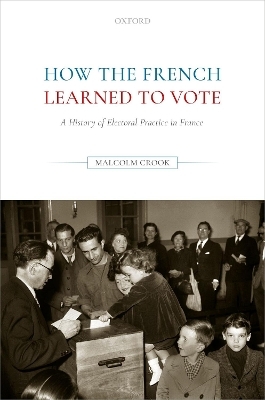
How the French Learned to Vote
Oxford University Press (Verlag)
978-0-19-289478-6 (ISBN)
The right to vote in regular elections is a fundamental principle of democracy. It constitutes a familiar civic ritual all over the world, yet few participants are probably aware of its long and controversial history. This was especially true of France, the country chosen for this study, which explores a wide range of issues surrounding voting in the context of a specific society. Casting a ballot does not come naturally and learning to vote is a lengthy process, like the achievement of free and fair elections which are open to all adults. An unprecedented experiment with mass voting for males was initiated in France in 1789, only for recurrent upheaval to ensure that the question of who could vote, including women besides men, and how they did so, was frequently addressed and amended. The entire electoral system was a constant source of partisan conflict, popular protest and innovation, throwing issues around the franchise, electoral corruption, spoiling papers and the problem of non-voting into especially sharp focus. This is the first book to explore these practices in a comprehensive fashion, from the perspective of ordinary people, beginning before the French Revolution and concluding with the present day, while according significant space to local as well as national elections. A thematic analysis will assist an understanding of those countries where democracy remains in its infancy, while also offering insight into widespread contemporary concern over declining turnout.
Malcolm Crook is Emeritus Professor of French History at Keele University, where he spent his academic career. A specialist in the French Revolution and Napoleon, he moved on to explore the history of voting in France, a subject on which he has written numerous articles and essays, including several comparative studies. He has published a good deal in French as well as English, and he was editor of the journal French History from 2002-2010.
Introduction: Why France
1: One man, one vote? The long march towards universal male suffrage
2: Why did women have to wait? A stubbornly resisted female franchise
3: The voters' choice? The question of candidatures
4: A matter of persuasion? Campaigning and corruption
5: Open secrets? From public to private polling
6: Getting out the vote? Electoral mobilization
7: Voting as a subversive activity? The ballot paper as protest
8: Gone fishing? Non-voting and the problem of abstention
Conclusion: Unfinished business
| Erscheinungsdatum | 31.03.2021 |
|---|---|
| Verlagsort | Oxford |
| Sprache | englisch |
| Maße | 160 x 242 mm |
| Gewicht | 578 g |
| Themenwelt | Geschichte ► Allgemeine Geschichte ► Neuzeit (bis 1918) |
| Geisteswissenschaften ► Geschichte ► Regional- / Ländergeschichte | |
| Sozialwissenschaften ► Politik / Verwaltung ► Staat / Verwaltung | |
| ISBN-10 | 0-19-289478-1 / 0192894781 |
| ISBN-13 | 978-0-19-289478-6 / 9780192894786 |
| Zustand | Neuware |
| Informationen gemäß Produktsicherheitsverordnung (GPSR) | |
| Haben Sie eine Frage zum Produkt? |
aus dem Bereich


